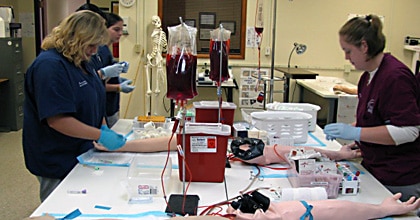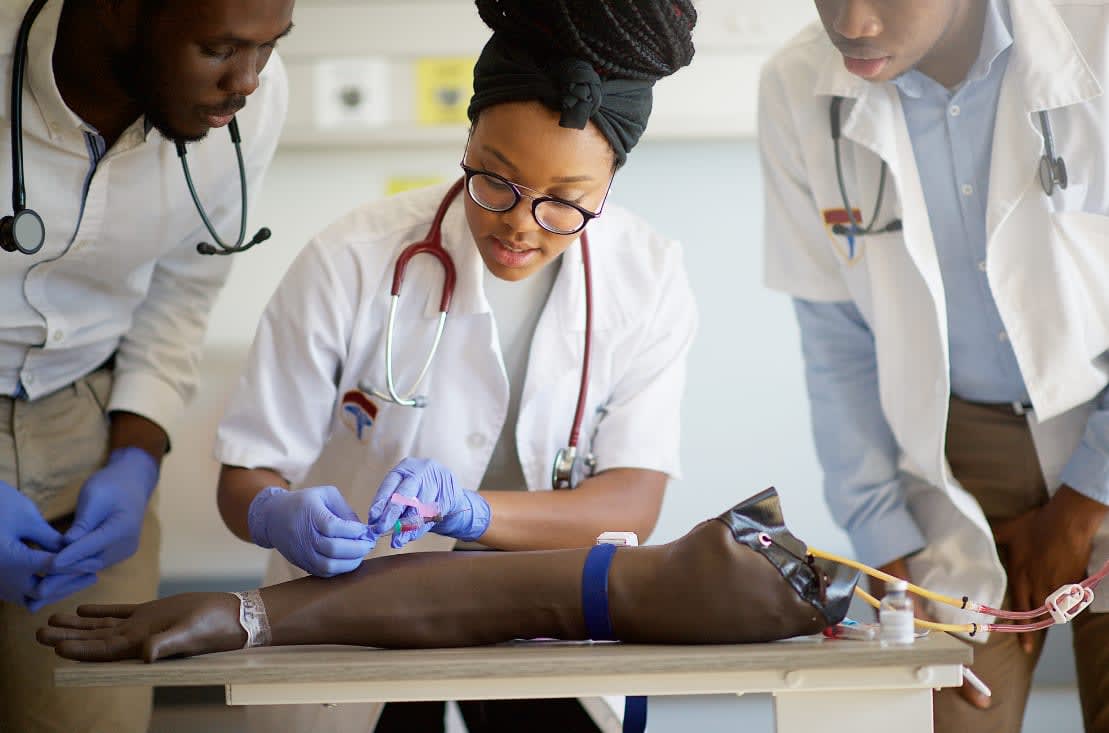Phlebotomy Training Course Success Tips: Study Habits
Phlebotomy Training Course Success Tips: Study Habits
Blog Article
The Path to Accreditation: Understanding the Phlebotomy Educating Program Journey and Its Value
As you consider the path to qualification in phlebotomy, it's crucial to comprehend the function you'll play in health care. Your training will cover important skills, from blood collection techniques to patient interaction.

The Function of Phlebotomists in Medical Care
Phlebotomists play a vital duty in the healthcare system, acting as the crucial web link between individuals and important diagnostic screening. You'll carry out blood draws, making certain samples are gathered accurately and securely. Your competence assists in detecting medical problems, checking health, and directing treatment decisions.
In your everyday communications, you'll require to establish count on with people, making them feel comfortable throughout what may be a demanding experience. You are accountable for identifying and handling samples meticulously to stop contamination or mistakes, which can impact test outcomes.
Yet, you'll usually work alongside doctors and registered nurses, interacting crucial information regarding individuals' problems. Your role is essential in maintaining the operations in healthcare setups, guaranteeing prompt and accurate outcomes. By grasping your skills, you add meaningfully to individual care, making you an essential part of the medical team. Embracing this obligation is essential to your success as a phlebotomist.
Introduction of Phlebotomy Training Programs
When checking out phlebotomy training programs, you'll find different types designed to fit various routines and learning styles. Each program aids you establish important skills like blood collection and client communication. Understanding these alternatives is vital to choosing the right path for your occupation.
Sorts Of Training Programs
Numerous kinds of training programs are readily available for those wanting to come to be efficient in phlebotomy. You can pick from certification programs, which usually last a few months and concentrate on crucial skills. There are likewise diploma programs that offer a more extensive education and learning, usually lasting as much as a year. If you're trying to find a much deeper understanding, an associate level in a related area could be the ideal fit. On-line courses use versatility for those stabilizing work or family commitments, permitting you to research at your very own speed. In addition, some healthcare facilities and facilities supply on-the-job training programs, providing useful experience while you discover. Whatever course you pick, each program intends to outfit you with the necessary skills for a successful phlebotomy job.

Key Abilities Created
Mastering phlebotomy needs a set of key skills that are developed with comprehensive training programs. You'll discover technological skills like correct vein option, needle insertion, and blood collection techniques. These hands-on methods assure you can do treatments safely and successfully. Additionally, communication abilities are essential; you'll need to engage with clients, discuss treatments, and placed them at simplicity. Recognizing composition and physiology is crucial, also, as it aids you situate capillaries and understand the body's response to blood draws. Finally, you'll gain knowledge of safety protocols and infection control, assuring you preserve a sterilized environment. Each of these skills is important for your success as a licensed phlebotomist, making you an important possession in any type of medical care setup.
Secret Elements of a Phlebotomy Training Course
In a phlebotomy training course, you'll concentrate on essential subjects that lay the groundwork for your future occupation. You'll engage in hands-on training that permits you to use what you have actually discovered in real-world settings. Both the curriculum and useful experience are important for your success as a phlebotomist.
Curriculum Summary
While going after a phlebotomy training program, you'll come across a curriculum created to equip you with essential abilities and expertise. Phlebotomy Classes Near Me. This curriculum commonly includes composition and physiology, concentrating on the circulatory system and recognizing blood parts. You'll likewise learn about various types of blood collection methods, consisting of venipuncture and capillary slit methods
Furthermore, infection control and safety and security protocols are necessary parts, guaranteeing you know how to preserve a sterilized environment. You'll research patient communication, stressing communication and empathy, which are vital for reducing client anxiousness. Finally, ethical and legal considerations will be dealt with, preparing you for real-world duties. This foundational knowledge will allow you to stand out as a phlebotomist and give high quality care in professional setups.
Hands-On Training Experience
Getting hands-on experience is a crucial component of your phlebotomy training program. This functional training allows you to apply what you've discovered in a real-world setting, boosting your abilities and confidence. You'll practice venipuncture techniques, learn how to handle various types of specimens, and obtain accustomed to the devices made use of in the area. Under the Go Here assistance of knowledgeable instructors, you'll fine-tune your skills, ensuring you're prepared for any type of situation you might encounter.
In addition, you'll get the opportunity to interact with clients, which is necessary for creating your interaction abilities. This combination of technical efficiency and social skills is vital for your success as a qualified phlebotomist. Ultimately, hands-on training is where concept meets practice, strengthening your understanding and preparedness for certification.
Qualification and Licensing Needs
Before you can start your profession in phlebotomy, it is vital to comprehend the qualification and licensing demands that differ by state. Many states require phlebotomists to hold a certification from a recognized company, such as the National Phlebotomy Association or the American Culture for Scientific Pathology. These accreditations usually entail passing an exam that checks your expertise and skills in the area.
In addition to certification, some states have specific licensing demands. You might need to finish a specific number of hours in clinical method, submit proof of training, or undergo a history check. It is necessary to investigate your state's laws to make certain you satisfy all needed requirements.
Remaining informed regarding these needs not only helps you safeguard a setting however likewise improves your trustworthiness as a professional. By meeting these requirements, you'll be well on your means to a successful career in phlebotomy.
Hands-On Training and Practical Experience
Hands-on training and practical experience are necessary elements of your phlebotomy education and learning, as they permit you to apply academic expertise in real-world circumstances. Throughout your training, you'll participate in supervised venipuncture, find out correct methods, and become familiar with numerous blood collection equipment. This direct involvement is essential for building your confidence and developing your skills.
You'll work carefully with experienced experts who can lead you through the subtleties of client anchor communication and sample handling. Each session not only reinforces your understanding but likewise prepares you for the fast-paced setting of health care setups.
Furthermore, lots of programs include scientific rotations, enabling you to experience diverse setups, from hospitals to outpatient clinics. This direct exposure aids you adapt to various obstacles and patient needs, ensuring you're well-prepared for your future function. Embrace these chances, as they're crucial to ending up being a competent and thoughtful phlebotomist.
Difficulties Dealt With During Training
While obtaining hands-on experience is necessary, it's crucial to acknowledge the challenges that can develop throughout your phlebotomy training. In addition, grasping the skills required for blood draws takes method; you might have a hard time with strategy originally.
Time monitoring can likewise be an obstacle, as balancing concept, sensible sessions, and personal dedications can feel daunting. You may deal with varying finding out rates among your peers, leading to sensations of insecurity if you assume you're dropping behind. Adapting to the different individualities of instructors can be challenging, as each may have a distinct training design.
Identifying these challenges early can prepare you for success and help you create durability throughout your training trip.
Profession Opportunities After Qualification

As you acquire experience, you could even think about concentrating on locations like pediatric or senior citizen phlebotomy, satisfying certain individual demands. Some phlebotomists select to advance their jobs by becoming laboratory technicians or pursuing additional education in healthcare fields.
Additionally, your certification can result in duties in training or managing new phlebotomists, permitting you to share your understanding. With the healthcare market continuously growing, your abilities will always remain in demand, leading the way for a stable and satisfying career. Accept the possibilities awaiting you!
Frequently Asked Inquiries
What Is the Common Duration of a Phlebotomy Training Training Course?
Phlebotomy training courses commonly last around four to eight weeks. You'll engage in hands-on technique, classroom direction, and on-line learning. Finishing this training prepares you for certification and a rewarding job in medical care.
Are Online Phlebotomy Courses Available?
Yes, online phlebotomy courses are offered. They use adaptability and comfort, Your Domain Name permitting you to research at your very own pace. Just validate the program is approved to meet accreditation needs and acquire important abilities for your profession.
Just How Much Does Phlebotomy Training Normally Cost?
Phlebotomy training generally sets you back in between $700 and $2,500, relying on the program and place. You ought to take into consideration elements like course length, consisted of materials, and hands-on experience when picking the appropriate training for you.
What Prevail Requirements for Phlebotomy Training?
Usual prerequisites for phlebotomy training often include a secondary school diploma or GED, booster shots, and a background check. Some programs may additionally call for standard health care knowledge or qualifications, ensuring you're gotten ready for hands-on training.
Can I Function While Finishing My Phlebotomy Training?
Yes, you can work while finishing your phlebotomy training. Lots of trainees equilibrium tasks with their researches, however ensure to manage your time successfully to ensure you satisfy both work and training dedications efficiently.
Report this page